What is the first thing that comes to your mind when you hear the name Petr Fiala? You can answer the question and then compare your answer to that of the musicians I have spoken to. A composer, choir master, founder of the Czech Philharmonic Orchestra Brno and the Easter Festival Petr Fiala is turning seventy today – congratulations!
After the tour around Germany you had a concert in Brno on the very same night. Do you even have time for non-musical celebration?
I am having a hard time finding free time for anything that is not music-related. We have just had concerts featuring my pieces in Brno, then the Glagolitic Mass in Prague and a Beethoven-Mozart programme in České Budějovice. Then we went to Linz for the final rehearsal and performance of Massenet’s Marie Magdalene. So the only time I had left was this Saturday because the ensemble was on its way to Linz and I was about to join them on Sunday morning. This week we are performing a series of Dvořák’s Requiem with the FOK orchestra. So it is impossible to take a break. It is very challenging, but it is the only way the ensemble can survive without regular subsidies. We are doing fine so far because the demand for our performances is very high, especially abroad where we are considered one of the best ensembles in Europe. This work is keeping us alive because the salaries paid by large top-quality orchestras are higher than those in the Czech Republic. Here you can barely cover your costs but we still perform with all Czech professional orchestras. We try to schedule a capella concerts as they are a sort of musical purification. Sometimes we manage to do so abroad thanks to our reputation.
You have been in contact with church music and the sacred music for general masses ever since you were a kid. Has it shaped your attitude towards singing as such?
Definitely. I played the organ at churches when I was ten and I would put together church choirs even when I was a boy. I am the oldest of thirteen children and our family was crazy about music. We would get together in the afternoon and sing folk songs as a choir. You can read about these customs in the book on the National Uprising. We would also organise a musical get-together where I would play the piano and my sisters would sing. Back then I didn’t consider going pro. After high school I wanted to study chemistry but I did not get in. My character profile said that I came from “a fanatical religious family”. So I worked as a construction work helper and later I was admitted to the conservatory. After graduation I studied at the academy where my tutors were Professor Kapr in composition and Professor Veselka in conducting. I focused on the conducting career and I founded the Czech Philharmonic Choir Brno much later.
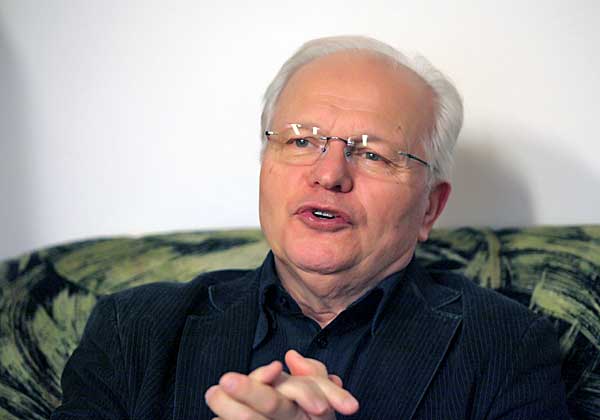 The first thing that comes to my mind is “an excellent choir master and composer and also my choir teacher at the Brno conservatory”. He was genuinely (and, I must say, legitimately) shocked by our performance but he would always keep it cool. Petr Fiala is a unique personality; he is a man with clear artistic goals which he has achieved at an extraordinary level. The Czech Philharmonic Orchestra Brno he founded and built from scratch is one of the best in the world. I have to think about this phrase every time I talk to famous conductors or managers of the world’s top orchestras and festivals who want to cooperate with him and who would jump any queue to be there first. Considering the conditions, it is unbelievable he managed to put together an ensemble that can measure itself with, and beat easily, some of the best ensembles in the world.
The first thing that comes to my mind is “an excellent choir master and composer and also my choir teacher at the Brno conservatory”. He was genuinely (and, I must say, legitimately) shocked by our performance but he would always keep it cool. Petr Fiala is a unique personality; he is a man with clear artistic goals which he has achieved at an extraordinary level. The Czech Philharmonic Orchestra Brno he founded and built from scratch is one of the best in the world. I have to think about this phrase every time I talk to famous conductors or managers of the world’s top orchestras and festivals who want to cooperate with him and who would jump any queue to be there first. Considering the conditions, it is unbelievable he managed to put together an ensemble that can measure itself with, and beat easily, some of the best ensembles in the world.
David Mareček, Director, Czech Philharmonic
Music listeners, from pop music to classical music, find the vocal music very attractive. Why is that?
The human voice is said to be the most amazing instrument. And it does sound beautiful. Plus there is one more thing: singers study the lyrics in various languages because of the current trends in music. Our choir can even sing in Hebrew. That’s what makes the vocal performance so special – listeners hear the words even though they do not understand what is being sung. We strive for the best possible pronunciation. It is my priority within the framework of our rehearsals. There might be excellent choirs, and even soloists for that matter, but you cannot understand a single word they are singing. Lyrics represent an added bonus in terms of musical expression.
Have you ever wanted go to solo?
Never, even though I did study voice on a part-time basis and my mentor at the conservatory, Professor Weinbergerová, said I had a beautiful tenor. My wife is a professional singer, I have learned a lot from her, because a good choir master cannot do their job without it. He or she must be familiar with the technical aspects of singing and be able to advise trained singers about the proper vocal level to ensure the proper timbre and unified sound. I know many choir masters who are good musicians but they cannot give their ensemble the much needed vocal culture. I prefer instrumental vocal management without any significant vibrato. I do not even pick these singers in tryouts even though their voice is impressive in other aspects – simply because it is inconsistent with my concept. Even foreign critics acknowledges this specific sound culture that we have.
Can you name all the ensembles you have managed throughout your career?
As a student I was the choir master of various amateur groups. For ten years I was the choir master of an excellent Slovak amateur choir student named Kysuca (some time ago I tried to count the awards from international competitions of amateur choirs, there were thirty-six). After the death of Professor Hradil I took over the all-male choir Foerster and I was helping my wife with the management of the all-girl choir Amititia that she herself founded. We created a mixed choir named Amititia-Foerster. Two years later and after much deliberation we renamed it the Czech Philharmonic Choir Brno. Of course people come and go; older members retire and are replaced by younger members. Apart from professional singers, its members include students of particular instruments or the Faculty of Education. Some of them have had a voice coach. Many of them are musically flexible which is a big plus because the choir sings different styles every other week.
Apart from your ensembles, we have an excellent opera choir in Brno, as well as Kantiléna, Ars Brunensis, the excellent amateur ensemble Vox Iuvenalis, the enthusiastic Janáček aficionados Láska opravdivá… we could say we are a choir superpower. How would you explain this?
It is a phenomenon I cannot explain. But it was one of the reasons I founded a professional choir. For me, singing has always been a natural part of Southern Moravia especially because of its folklore background that we can build on. Plus there was the tradition of excellent choir masters like Šoupal or Steinmann and their followers like Professor Veselka. He was my teacher and a great personality. He was fired from JAMU and Mr. Pauer gave him the task to improve the Prague Philharmonic Orchestra.
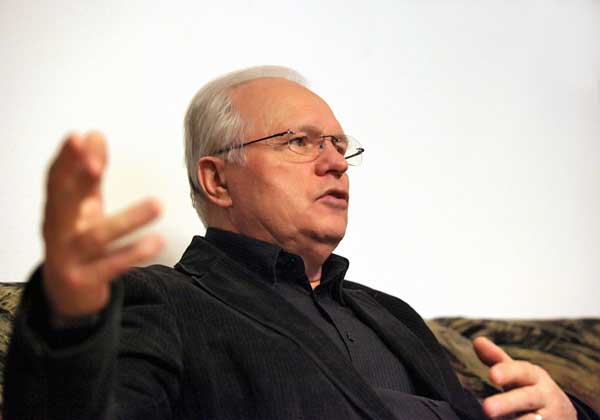 To me he is an important person. Apart from Pavel Kühn he was the only conductor who believed in me and gave me a chance at concerts. And who could forget his choir.
To me he is an important person. Apart from Pavel Kühn he was the only conductor who believed in me and gave me a chance at concerts. And who could forget his choir.
Simona Houda Šaturová, singer
Is your focus on the vocal performance reflected in the composition of instrumental pieces?
I don’t think so. And I feel like I should explain my “composing”. After graduation at JAMU in 1971 I was an eager composer and my choir-related activities were sporadic. Plus I was a teacher at the conservatory for 33 years and the two professions complemented one another. I composed a lot of things but I was not affected by vocal music. I composed a few pieces with a very strong instrumental element.
…you composed the ballet named Hořící kámen, music “without voice”.
Yes, plus three symphonies, numerous quartets and chamber music pieces. I also composed many pieces for the accordion because I was asked to do so by my colleague Professor Tesař who was an accordionist himself. So I mass-produced some twenty-five pieces for the accordions which have spread all over the world. I have become a famous composer thanks to them without really planning it. I also wrote numerous songs, cantatas and oratorios; I have been cooperating with an amazing poet Zuzana Renčová Nováková my whole life. I have written some two hundred opuses but lately I have had no time for composing. Only recently I managed to compose a ten-minute poem for bass-baritone and organ on the occasion of the anniversary of the arrival of the Sts Cyril and Methodius, which will be sung by Richard Novák.
This year’s Easter Festival of Sacred Music will include your concert as the final concert at Petrov. You founded this festival. What is there to say about the last twenty years, as you were in charge of the dramaturgy?
I like looking back because I founded the festival, I took care of things, it is like my baby. I was in charge of boosting the visitor numbers. Young musicologists complained about me keeping Stabat Mater on the programme. It was because I considered it to be the main resident piece of the festival. Today I am glad the festival has found its place. It is the longest running Easter festival in the Czech Republic. After twenty years, and after much consideration, I have decided that it was time for a management change. Our choir will perform every once in a while.
This Easter festival addresses old and contemporary music more than it used to. More often than not the venues include churches other than Petrov. What do you think about these changes?
Every change has its meaning. Placing individual concerts in various churches is more complicated in terms of production. However, it is a good idea and I am glad it has been done. I am aware of the fact that the acoustic qualities of Petrov are not optimal. We all know that. But its genius loci would always outweigh the acoustic imperfections. Plus the new repertoire has to find its audience. Without the audience an idea is just an idea. Generally and politely speaking, the attendance at concerts in Brno is way below average. Brno does not score well even in comparison with Olomouc or Ostrava, not to mention foreign cities. As for the festival as such, I expected that after twenty years someone new will come up with ideas. It never hurts.
The celebration of your birthday will include a concert of your choir in Jaroměřice in August. Did you get to pick the repertoire as a birthday present?
Not really. I did however have to pay attention to the atmosphere of the church. It is a beautiful Baroque church perfectly suitable for a chamber-sized ensemble. I included four prayers composed by my favourite composer Francis Poulenc, as it is his anniversary this year. I also included a few of Bruckner’s motets. I was asked to include something modern as well, so I added Dvořák’s Mass in D Major. People like it and it can be performed in a very chamber-like style even with organ accompaniment. So the repertoire respects the atmosphere of the church, there is nothing special about it.
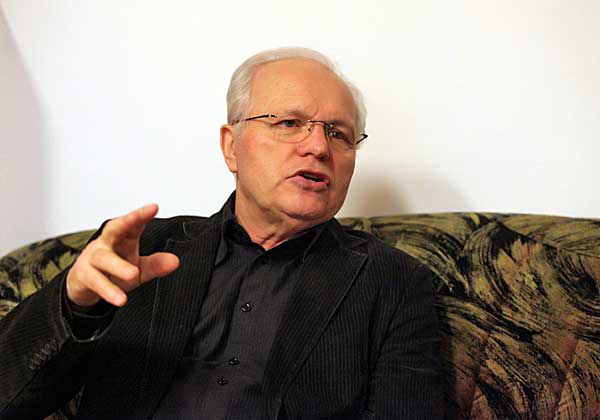 The first thing that comes to my mind is his Philharmonic Choir Brno because it is an amazing achievement. He is more famous thanks to this ensemble than through his composing, the latter being his secondary activity. His successes are great for the entire field of Czech choir music. Plus it is in Brno, the home of an excellent opera choir thanks to Josef Pančík. I would like to live long enough to see these two ensembles do something amazing together.
The first thing that comes to my mind is his Philharmonic Choir Brno because it is an amazing achievement. He is more famous thanks to this ensemble than through his composing, the latter being his secondary activity. His successes are great for the entire field of Czech choir music. Plus it is in Brno, the home of an excellent opera choir thanks to Josef Pančík. I would like to live long enough to see these two ensembles do something amazing together.
Richard Novák, singer
You won the Echo Klassik 2007 award for the recording of Anton Bruckner’s motets. Do you like them on a personal level?
The first decent performance of Bruckner’s motets was by Brněnští madrigalisté with Pepík Pančík. They were an excellent amateur choir; my wife was the alto. These motets caught my attention and I decided to rehearse all of them sooner or later. So when I founded the professional choir that has achieved a certain level of quality over time, we decided to add them to our repertoire one by one. And eventually an offer came from an excellent label named Musikproduktion Dabringhaus und Grimm, saying they want to record all of them. We would not even dream about Echo Klassik, let alone in Germany because the ensembles there are convinced they hold a trademark when it comes to Bruckner. In the same year we won yet another Echo Klassik award for the recording of Liszt’s oratorio Christus with the Bonn orchestra. It won the best record of the year and we also won an award for the best choir for the motets. The awards from abroad helped us a lot. We are the only Czech ensemble to ever have won the Echo Klassik award.
What music style, period or attribute in general do you prefer on the personal level?
I have a degree in composing, so my preferences include the music of the 20th and, by now, the 21st century. I know something about it and I know how to rehearse it without flushing the choir. I do not have a favourite period; we do everything from the Renaissance to modern music. We are professionals and we have to be able to play anything. The things I like the most include the Romanticism, Brahms’ German requiem, all big pieces by Dvořák or Mahler, especially the second and third symphony, even though we often perform the eighth symphony – we have recorded all of them several times.
What do you think about the so-called “historically accurate” interpretation of old music?
Sometimes I listen to it and I think it is interesting, even though it is not my cup of tea. Sometimes they seem to have reserved the right to the only acceptable interpretation. Once I rehearsed Berlioz’s Romeo and Juliet with Sir Norrington. He forced us and the orchestra to use an absolutely flat tone without vibrato. The sound was dead, it had no excitement. I did not understand what it was supposed to be about. As for the “historically accurate” interpretation, I like compromises in style, the examples of which include John Eliot Gardiner and Monteverdi Choir. Their style is perfection. I was also pleasantly surprised to find out in the Pleyel hall in Paris that only two choirs were scheduled to appear in that particular season – Monteverdi Choir and us.
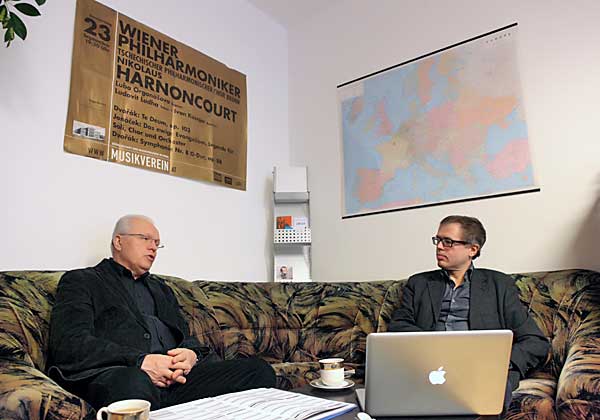 Is there anything that you would refuse to do regardless of the amount offered?
Is there anything that you would refuse to do regardless of the amount offered?
I don’t want to do revues or musicals because we would feel like “music prostitutes” and we would have to stoop to an unacceptable level. That being said, we performed Andrew Lloyd Webber or Leonard Bernstein, we even recorded a rock opera Pietro e Lucia composed by the Slovak composer Dušan Rapoš, but that is as low as I am willing to go.
Is it even consistent with your values?
Of course, some scandalous musical and other productions do not hesitate to play with Satanism, which would be crossing the boundary for me. I find this absolutely unacceptable.





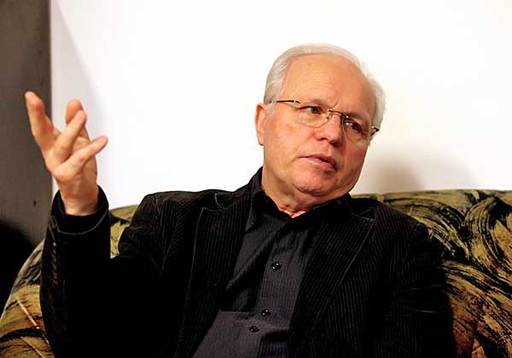



























No comment added yet..